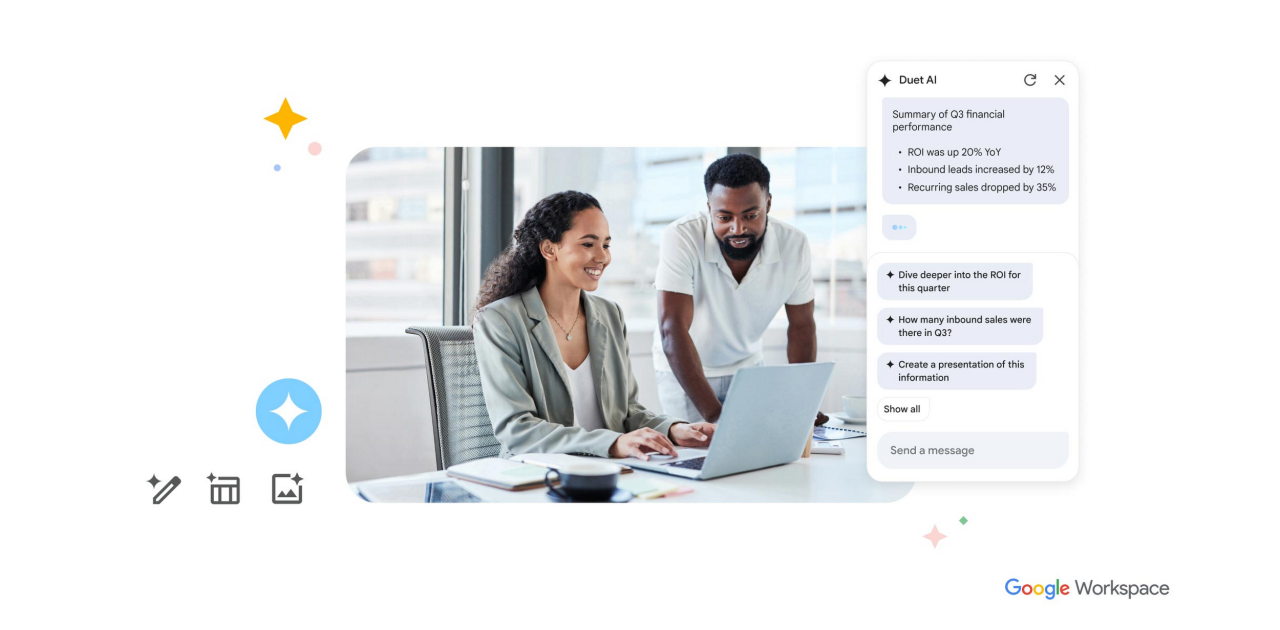
Google Starts GenAI Productivity Onslaught with Duet AI for Workspace Release
As we enter the post-Labor Day unofficial start of fall with back-to-school and, for many, back-to-office, it seems fitting to be thinking about productivity software. After all, it is the tool that gets used more in those environments than anything else.
I’m also convinced it’s the application that’s going to not only bring generative AI back to the mainstream news cycle, but also cement GenAI’s role in the minds of most everyone as something that’s going to be profoundly impactful. As the mainstream productivity suites from Google (now with Workspace) and Microsoft (likely shortly with Office and M365) start to enter general availability and usage, regular people are going to start personally experiencing what GenAI can really do.
Up until now, even with the early popularity of applications like ChatGPT, most of the experimentation and early efforts with GenAI have been done by those with a relatively strong technical bent. Though it may be hard to believe, the vast majority of people still haven’t used any type of GenAI tool or capability.
When they start to—thanks to the expected ubiquity of GenAI-powered productivity suites—well, let’s just say that Gartner’s recent comments about how GenAI is already entering the trough of disillusionment phase of its infamous technology adoption model are going to sound ridiculously out of date. Only after the widespread usage starts will we even begin to climb the curve towards the hype cycle.
Google officially kicked things off at last week’s Cloud Next event with the announcement of the general availability of Duet AI for Workspace. The impressive 3 billion user strong base of Workspace users (and 10 million paying customers) now have access to many features first demonstrated last spring as well as several new capabilities that just debuted last week.
Pricing for the new Duet AI for Workspace is $30 per user per month—matching what Microsoft said they would be charging for the GenAI-powered 365 AI Copilot version of Office—but Google is also offering a free 30-day trial for anyone who wants to try the service.
领英推荐
Duet AI for Workspace includes the ability to generate text or images in Gmail and Docs, organize data in Sheets, and build new images and presentation material in Slides. In addition, the company added new features to both Meet and Chat. Meet now includes video enhancements, called Studio Look, to improve the visual quality of your webcam. The enhanced Meet can also automatically take notes for a meeting, create quick summaries and video snippets, do real-time translations in over 18 different languages, and even attend a meeting on your behalf to allow you to make a point even if you can’t attend.
The updated Google Chat includes summarization capabilities for any chats or documents shared in a chat as well as the ability to quickly start an audio “huddle” call with all participants in a current chat. In addition, Chat features a new UI as well as the ability to chat with the AI engine itself in a digital assistant-like fashion for things like summarizations and complex queries.
All told, it’s a comprehensive start and hints at even more advanced capabilities to come, including integration with a growing range of partner applications. What’s particularly interesting is that Duet AI for Workspace is starting to show signs of a true digital assistant-type experience with Google hinting at forthcoming features that will be able to perform proactive actions on behalf of the user. So, for example, it could start the process of booking a meeting based on the content of a chat or email thread, offer flight suggestions for an upcoming trip on the calendar, and much more.
Recent research on GenAI shows that productivity applications are already some of the most used and requested types of activities that organizations are looking for, so it’s clear there is a strong appetite for the kinds of tools that Duet AI is bringing to Workspace. Plus, there’s also a great deal of interest in digital assistant-type features among IT decision makers planning their companies’ GenAI deployments, so I’m expecting strong uptake of these new Google offerings.
The only remaining question is how end users will start to react to these capabilities once they become available. There’s likely going to be a great deal of appreciation as people start to realize how much time they can save from the more tedious parts of their job. At the same time, some will undoubtedly start to notice that a few of the tasks that were once seen as a key part of their work are now being automated in a way that could frighten them about the future viability of their position. This is the dual-edged nature of GenAI and the questions about how the workplace evolves because of it will likely linger for some time to come.
Bob O’Donnell is the president and chief analyst of TECHnalysis Research, LLC a market research firm that provides strategic consulting and market research services to the technology industry and professional financial community. You can follow him on LinkedIn at Bob O’Donnell or on Twitter @bobodtech.
Great article, Bob! Naturally what comes up for me is the security aspect of GenAI. As we enable more and more feature/function, how do we assure that the meetings it is setting up on our behalf, the points it is making on our behalf, while attending a meeting for us are really representing us? This is an area that I hope we can study in the future: vulnerabilities extant in GenAI and protections that exist today. Let’s huddle! ??